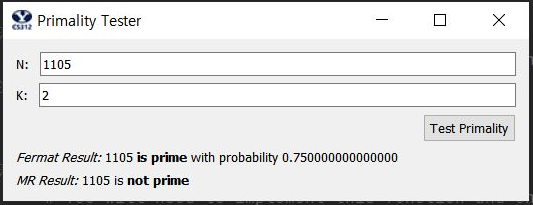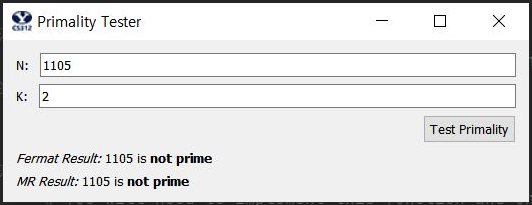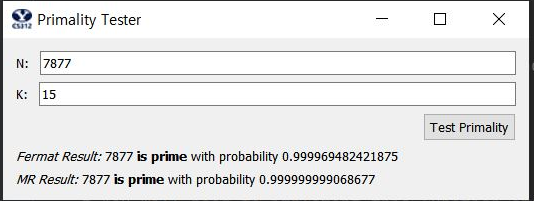Algorithms - Primality Test
Project #1: Primality Test
1. Screenshot of my application

2. All of the code I wrote
2a. Implementation of modular exponentiation.
def mod_exp(x, y, N):
if y == 0: return 1
z = mod_exp(x, int(y/2), N)
if y % 2 == 0: # if y is even
return z**2 % N
else:
return (x * z**2) % N
2b. Implementation of the Fermat primality tester.
def fermat(N,k):
for x in range(k):
a = random.randint(2, N-1) # positive integers less than N. a=1 is not useful so not included.
if mod_exp(a, N-1, N) != 1:
return 'composite'
return 'prime'
2c. Implementation of the Miller-Rabin algorithm.
def miller_rabin(N,k):
for x in range(k):
a = random.randint(2, N-1)
if mod_exp(a, N-1, N) == 1: # starts with Fermat's theorem
exp = N-1
while exp % 2 == 0: # while exponent is even, take divide exponent by 2 (take the square root)
exp = int(exp/2)
mod_exp_result = mod_exp(a, exp, N)
if mod_exp_result != 1: # first time when mod_exp result is not 1
if mod_exp_result == N - 1: # if result is N-1 (mod N) == -1 (mod N)
return 'prime'
else: # if the first non-1 result is not -1, N is composite
return 'composite'
else:
return 'composite' # if a^(N-1) mod N returns anything else than 1, it is composite.
return 'prime' # if all test is passed for k times, N is most likely a prime number.
2d. A brief discussion of some experimentation you did to indentify inputs for which the two algorithms disagree and why they do so. Include a screenshot showing a case of disagreement.
- when I experimented with small numbers for k like 1 or 2 or 3, I could find some cases that fermat says it is prime but miller_rabin says it is composite number.
- for example, 561 or 1105 (another Carmichael number) had that problem.
- non-Carmichael number rarely had errors, but they were more unlikely to have errors than Carmicahel numbers.


3. Time/ Space complexity
def mod_exp(x, y, N):
if y == 0: return 1
z = mod_exp(x, int(y/2), N)
if y % 2 == 0: # if y is even
return z**2 % N
else:
return (x * z**2) % N
- Both multiplications of z**2 (z * z) takes O(n^2) time complexity when n is number of bits representing N, and the recursion happens until y == 0, which means log base 2 of y times. Therefore, the whole method takes O(n^2 * log_2 y) time complexity.
- Since we are mostly setting y to N-1, we could say log_2 y is n, which makes O(n^3) time complexity.
- Each function call will take O(n) space complexity and that stacks up log(n) times which adds up to O(nlogn) space complexity.
def fermat(N,k):
for x in range(k):
a = random.randint(2, N-1) # positive integers less than N. a=1 is not useful so not included.
if mod_exp(a, N-1, N) != 1:
return 'composite'
return 'prime'
- First, the whole thing is repeating k times. And each iteration will have O(n^3) from mod_exp function.
- Therefore, time complexity of this function is O(n^3)
- Modular exponential’s space complexity was O(nlogn) and it is just repeating it k times, so space complexity stays the same. O(nlogn) space complexity.
def miller_rabin(N,k):
for x in range(k):
a = random.randint(2, N-1)
if mod_exp(a, N-1, N) == 1: # starts with Fermat's theorem
exp = N-1
while exp % 2 == 0: # while exponent is even, take divide exponent by 2 (take the square root)
exp = int(exp/2)
mod_exp_result = mod_exp(a, exp, N)
if mod_exp_result != 1: # first time when mod_exp result is not 1
if mod_exp_result == N - 1: # if result is N-1 (mod N) == -1 (mod N)
return 'prime'
else: # if the first non-1 result is not -1, N is composite
return 'composite'
else:
return 'composite' # if a^(N-1) mod N returns anything else than 1, it is composite.
return 'prime' # if all test is passed for k times, N is most likely a prime number.
- This function has for loop repeating k times.
- Inside that there is a while loop that repeats log_2 N times. (n)
- inside that while loop, there is mod_exp function that has O(n^3)
- So, the time complexity of this function is O(n^4)
- Space complexity will be O(n log(n)) as there is nothing much space taken other than repeating the mod_exp function.
4. Probabilities of correctness
- Fermat p
- I used the probability of getting the error and subtracted it from 1
1 - 1/2**k
- Miller-Rabin p
- For at least 3/4 of the possible choice of
athat will not be the case (which means there might me an error for 1/4 of possiblea’s. 1 - 1/4**k
- For at least 3/4 of the possible choice of
def fprobability(k):
return float(1 - 1/2**k)
def mprobability(k):
return float(1 - 1/4**k)